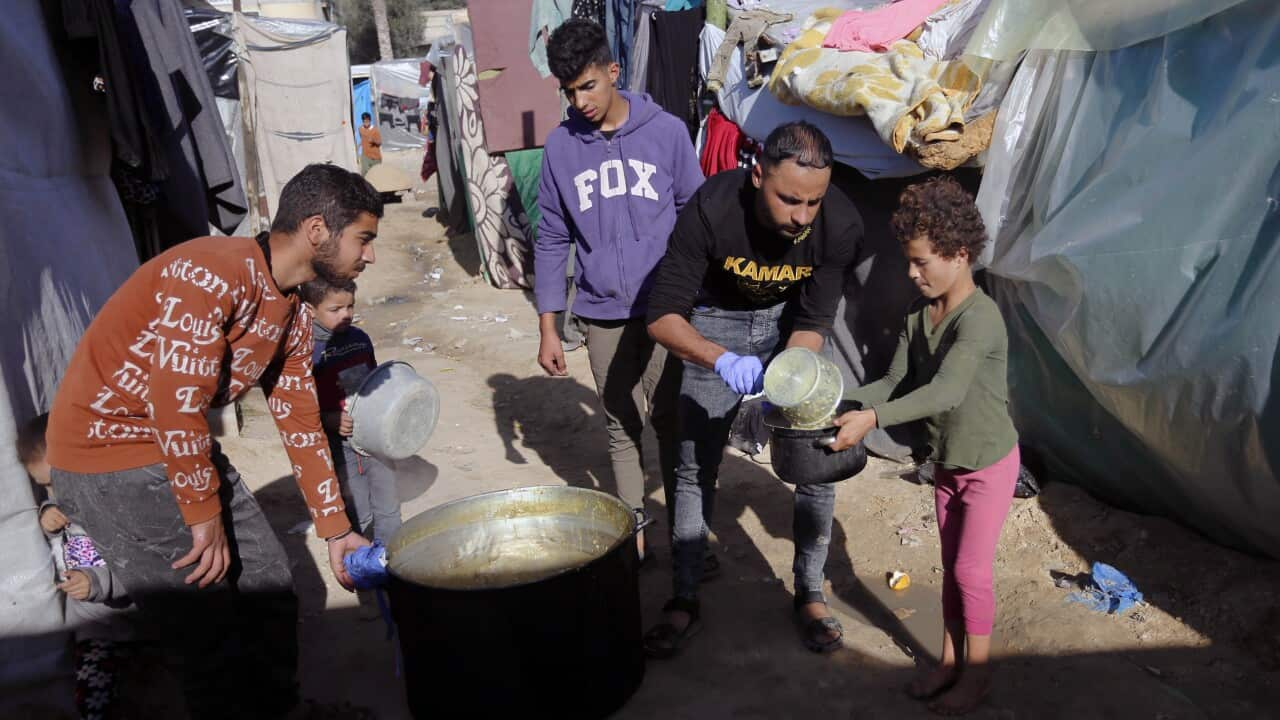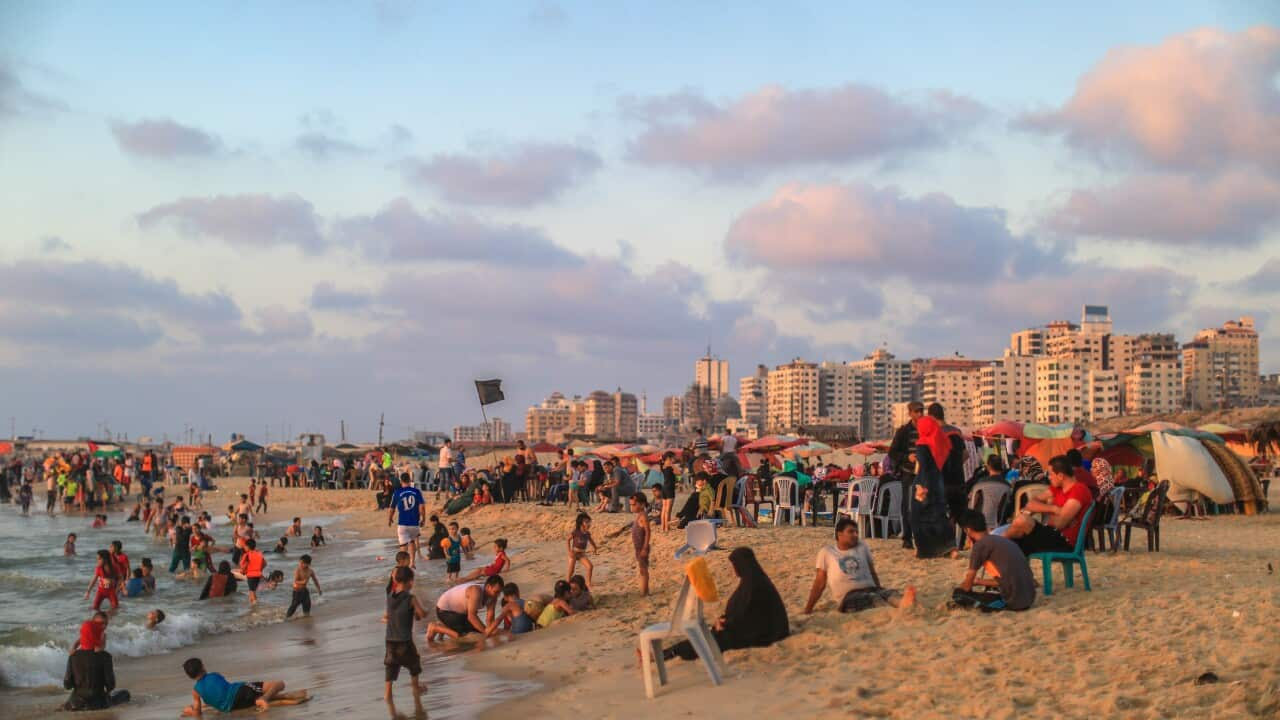Key Points
- A UN-backed report has warned 2.3 million people in Gaza are at risk of starvation.
- Desperate Gazans have jumped onto aid trucks to try to grab scarce supplies.
- At least one in four households in Gaza - or 577,000 people - are already facing catastrophic hunger.
The entire 2.3 million population of the Gaza Strip is facing crisis levels of hunger and the risk of famine is increasing each day as the Israel-Hamas war grinds on, a UN-backed body said in a report published on Thursday.
That makes the proportion of households in the Palestinian enclave that are in hunger crisis, or suffering from high levels of acute food insecurity, the largest ever recorded globally, the report by the Integrated Food Security Phase Classification (IPC) said.
The humanitarian situation in Gaza has deteriorated rapidly since Israel began a major military operation on 7 October, in response to a deadly rampage into Israel by militants of Gaza's ruling Hamas group. Heavy airstrikes and a ground offensive have since laid waste to wide areas of the enclave.
Trucks bringing aid from Egypt have delivered some food, water and medicine, but the United Nations says the quantity of food is just 10 per cent of what is needed for the territory’s inhabitants, most of whom have been displaced.
“There is a risk of famine and it is increasing each day that the current situation of intense hostilities and restricted humanitarian access persists or worsens,” the IPC report said.
Distribution of aid within Gaza has been hampered by military operations, inspections of aid demanded by Israel, communications blackouts and shortages of fuel.
Some desperate Gazans have jumped onto aid trucks to try to grab scarce supplies of food and other goods. There have been reports of residents eating donkey meat and emaciated patients seeking medical help.

Palestinians flock to a truck carrying drinkable water, as they face the threat of hunger and thirst in Rafah, Gaza. Source: Getty / Anadolu
"I've been doing this for the last 20-plus years. I’ve been to Afghanistan, I've been to Yemen, to Syria, South Sudan, Ethiopia, northeast Nigeria. But I've never seen something this bad happening this quickly," he told Reuters in an interview.
The IPC, produced by a partnership including UN agencies and NGOs, sets the global standard for determining the severity of a food crisis using a complex set of technical criteria.
Crisis or Phase 3 levels of hunger mean households are suffering from high rates of acute malnutrition or can only meet minimum needs through crisis-coping strategies or using up essential assets, according to the IPC.
The IPC's most extreme warning is Phase 5, which has two levels, catastrophe and famine.
At least one in four households - or 577,000 people - in Gaza are already facing catastrophic hunger, suffering from an extreme lack of food, starvation and exhaustion of coping capacities, the IPC found.
That is more than four times as many people as those estimated to be facing catastrophic hunger elsewhere in the world, Husain said.
In Sudan, the IPC estimates that war has driven some 37 per cent of the population into Phase 3, or crisis levels of hunger, with 10 per cent of the population facing Phase 4 "emergency" levels.
In South Sudan, the IPC found 46 per cent of the population faced crisis levels of hunger in recent months, while in Afghanistan the estimate was 29 per cent.
Famine has been declared only twice in the past 12 years, in parts of southern Somalia in 2011 and in parts of South Sudan in 2017.
"If the war continues the way it is, if the assistance is not coming in the way it should, we will be looking at a famine in the next six months," Husain said of the situation in Gaza.
"Whether it happens in two months or whether it happens in three months, it's anybody’s call."
Fighting escalates in the Gaza Strip
Israeli bombing was at its most intense over the northern part of the Gaza Strip on Thursday, where orange flashes of explosions and black smoke could be seen as morning broke from across the fence in Israel.
In Tel Aviv, sirens wailed and rockets exploded overhead, intercepted by Israeli defences. Israel's Magen David Alom ambulance service said there were several impact points but no initial word on casualties.
The armed wing of Hamas said it had fired the salvo in response to Israel's killing of civilians.
Residents in Jabalia in the north of the Strip close to the Israeli border said the area was completely cut off with Israeli snipers now firing on anyone trying to escape.
In a social media post, the Palestinian Red Crescent said ambulances were now unable to reach large numbers of casualties inside Jabalia.
Israel has bombarded Gaza since Hamas' 7 October attack in which more than 1,200 people, including an estimated 30 children, were killed and over 200 hostages taken, according to the Israeli government.
More than 20,000 people have been killed in Gaza since 7 October, according to the health ministry in Hamas-controlled Gaza.
The war between Hamas and Israel is the latest escalation in a long-standing conflict.
Hamas is a Palestinian political and military group, which has governed the Gaza Strip since the most recent elections in 2006.
Hamas' stated aim is to establish a Palestinian state and stop the Israeli occupation of Gaza and the West Bank, illegal under international law.
Hamas in its entirety is listed as a terrorist organisation by the European Union and seven other countries, including Australia.
The UN Assembly rejected classifying Hamas as a terrorist group in a 2018 vote.
In 2021 the International Criminal Court opened an investigation into alleged Israeli war crimes in the Palestinian territories dating back to 2014, including the recent attacks of both Israel and Hamas.
No 'fully functioning' hospitals left in Gaza, WHO says
The World Health Organization said there were no 'fully functioning' hospitals left in Gaza amid continued Israeli airstrikes, in a post on social media platform X on Thursday.
Of Gaza's 36 hospitals, it said 23 were not functioning at all, while nine were partially functioning and four were at minimum function.
"Gaza's health system needs urgent resuscitation," it wrote.














